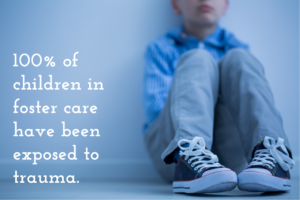Blog
Overcoming Trauma
Imagine being six-years-old and you have just started kindergarten. You are learning to read and making new friends at school. Then, abruptly, you are removed from the familiarity of all you know after claims of neglect have been substantiated by local authorities. A nice couple call themselves your foster parents, but you don’t understand what that means or why you must live with strangers. You feel plagued with uncertainty, overwhelmed by the trauma of leaving home.
A few weeks later, you are promised a visit with your mom. You can’t wait! Finally, things seem like they will be going back to normal. But then she doesn’t come. “Why,” you ask yourself, “is this happening to me? What did I do wrong? Does she not love me?”
If unmanaged, childhood trauma can have serious, lasting effects.

The uncertainty and turmoil when entering foster care can be traumatic for children at any age. For kids who are too young to understand the system, it can be especially distressing when scheduled visits with birth parents are cancelled or rescheduled.
This is the case for Justin, a six-year-old whose mother has missed the last three visits with him. Each time, Justin’s foster parents reassure him and try to lighten his spirits, but it hasn’t helped. The distress is starting to spill into other areas of Justin’s life. He has outburst that can last from 20 minutes up to three hours. The family has had to miss functions out of fear that Justin would have a meltdown. At school, Justin has frequent visits to the principal’s office and notes sent home describing unacceptable behavior in the classroom. Out of concern and frustration, his foster parents turn to their case manager at LFCS who refers the foster family for counseling services.
Meeting his therapist makes Justin feel uneasy. He is very skeptical of new adults because of his past experiences. At his first appointment, Justin refuses to go to the counseling office and his therapist sees his discomfort. They play and build a rapport in the waiting room for nearly an hour. At the end of the appointment, Justin feels comfortable enough to walk back to the office and look around before leaving. With each following appoint, Justin is less and less nervous. He responds well when his thoughts and feelings are validated, and likes to be given choices. Because Justin is determined to be independent, attachment is often a focus in therapy. The therapist discusses trauma, attachment, and parenting strategies with Justin’s foster parents. The goal is to help him learn to regulate his emotions and create a more positive environment for the whole family.
Justin begins to practice self-soothing strategies to regulate his emotions, especially when a visit with his birth mom is planned or there is a change in his schedule. Because of the support he receives from his LFCS counselor, his outburst now only last 5 minutes – a big improvement since starting therapy.
Justin also shares about his family – both biological and foster – in sessions. He is more trusting of his therapist, the negative reports from school have decreased and he has not been to see the principal in the past two months. His journey is far from over, but Justin has come so far in such a short time. We can’t wait to see the great things in store for him in the future!